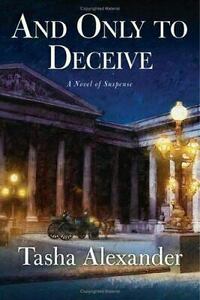You need to sign in or sign up before continuing.
Take a photo of a barcode or cover
1888 and Lady Ashton is near the end of her mourning for her husband Viscount Philip Ashton, after their short marrigae. Only marrying him to escape her mother she now starts to learn about her husband, someone she never loved. What secrets did he hold.
Emily Ashon seems to change from a shallow individual to a petulant widow who disregards the societys' mores. Not liking the main character was a problem, and I did lose interest in the story.
Emily Ashon seems to change from a shallow individual to a petulant widow who disregards the societys' mores. Not liking the main character was a problem, and I did lose interest in the story.
Absolutely wonderful!!
One of the few cases of historical fiction that isn't dribble! I will be reading the next in the series. Lady Emily has my heart!
One of the few cases of historical fiction that isn't dribble! I will be reading the next in the series. Lady Emily has my heart!
I loved this book! Lady Emily is a pistol, and considering that the time she lived in DID NOT encourage that makes it even better that she thumbs her nose at everything society dictates at every opportunity.
This is the first of a series, and the story is quite a clever and interesting. The author combines the structures of the time and the idiosyncrasies of "society" with an unusual set of circumstances that allow Emily to be unorthodox and get away with it.
I liked that Emily has quite a bit of character development as the book progresses, going through a variety of emotions and situations that help her become someone a modern reader can root for and cheer for as she grows and develops. She mostly makes decisions I agree with and applaud, and if there are a few moments where I wanted to tell her to "snap out of it!" well, she is a product of her time so nobody can completely throw off their upbringing and society I guess.
The plot of this book has lots of adventure and dramas for the various characters to engage in as part of Emily's world, and the supporting characters are fun and unique and quirky and as likeable [except the ones who aren't!] as Emily is and a wonderful addition to her world and her adventures.
There is really virtually nothing about this book I DIDN'T like, and I am happy there's a whole series of books to continue Lady Emily's story. I hope they are all as fun and entertaining as the first one, and I look forward to reading more of them.
Recommended if you like Victorian era England, English society/manners stories, spunky female characters going against society's dictates.
This is the first of a series, and the story is quite a clever and interesting. The author combines the structures of the time and the idiosyncrasies of "society" with an unusual set of circumstances that allow Emily to be unorthodox and get away with it.
I liked that Emily has quite a bit of character development as the book progresses, going through a variety of emotions and situations that help her become someone a modern reader can root for and cheer for as she grows and develops. She mostly makes decisions I agree with and applaud, and if there are a few moments where I wanted to tell her to "snap out of it!" well, she is a product of her time so nobody can completely throw off their upbringing and society I guess.
The plot of this book has lots of adventure and dramas for the various characters to engage in as part of Emily's world, and the supporting characters are fun and unique and quirky and as likeable [except the ones who aren't!] as Emily is and a wonderful addition to her world and her adventures.
There is really virtually nothing about this book I DIDN'T like, and I am happy there's a whole series of books to continue Lady Emily's story. I hope they are all as fun and entertaining as the first one, and I look forward to reading more of them.
Recommended if you like Victorian era England, English society/manners stories, spunky female characters going against society's dictates.
adventurous
funny
hopeful
mysterious
slow-paced
Plot or Character Driven:
A mix
Strong character development:
Yes
Loveable characters:
Yes
Diverse cast of characters:
Yes
Flaws of characters a main focus:
Complicated
3.5
An enjoyable read, if not a bit shallow. I expected more mystery.
An enjoyable read, if not a bit shallow. I expected more mystery.
adventurous
mysterious
fast-paced
Plot or Character Driven:
Plot
Strong character development:
Yes
Loveable characters:
Yes
Diverse cast of characters:
No
Flaws of characters a main focus:
Yes
Not a perfect book, but a fun romp through Victorian England, full of mystery and intrigue. A good quick read for a break between rougher books.
I enjoyed it but I wasn't blown away by it. There seems to be far too much time spent on irrelevant material. Maybe it's exposition for the rest of the series, but I found it really distracting. The clues seemed to be thrown away, but not in a "you need to pay attention to get it" like you would find in Christie or Doyle, but in a very obvious way, as if she's trying to hide them in plain sight but failing. I've been told to give the rest of the series a chance; I'll see how long I can hold out
I believe I have at least a handful of talents, but alas, the ability to raise a singular eyebrow is not one of them. Which is unfortunate, because I do think this would have been a supremely useful talent to possess while reading And Only to Deceive in all its overly dramatic glory.
The premise of the novel is a promising one. It tells the story of the recently widowed Lady Ashton, who harbored little more than affectations of intimate feelings towards her husband in her short-lived marriage. Upon reading his journal, she finds that he is a decidedly intriguing man with an appreciation for Ancient Greek artifacts, and she regrets not having had the chance to fall in love with him. It is under these circumstances that she begins to look into the Iliad, and, subsequently, lands herself in the midst of a mystery that brings into question her recent acquaintances and, most of all, her late husband.
I think, Emily's transition from indifferent widow reaping the benefits of her husband's fortune to besotted appreciator of artifacts of the antiquity was engaging and believable, and quite possibly the novel's strongest point. What disenchanted me was the lack of care put into other aspects of her character--indeed, there is very little depth to her beyond her scholarly pursuits. In my estimation, the author probably intended her lack of.. personality? to be indicative of this time period, perhaps believing that too strong of a heroine would be at odds with the Victorian era (she said as much in her Author's Note). What was likely intended as historical accuracy resulted in a somewhat lifeless, dull, underdeveloped heroine. I can't pinpoint what exactly was missing from her character, some spark or idiosyncrasies that would prevent her from blending into her surroundings. I just cannot fathom what would enchant Lord Ashton so much that he would wax poetic about her in all his journal entries.
Another issue I had with Emily was her recurring irritation with Philip's ardor for hunting. Why was she so adamant in her disliking of his hobby? And why must someone have the same exact interests as you for you to express an interest in their friendship? I didn't really understand why it irked her so, even after the fact of her falling in love with him. Indeed, this shallow approach would color many of the aspects of this novel--her lack of personality being one of them--and is ultimately the reason I could not connect with And Only to Deceive.
Having read, appreciated, and dissected the Iliad in a class I took a couple semesters back, I could not help being excited for its inclusion in this novel. This excitement was short-lived as I realized Alexander did not intend to treat it with as much care and depth as I had anticipated, instead reserving its discussion to whether or not Achilles was a bad guy. Honestly, I found Emily's obsession with the Hector vs. Achilles debate a bit stupid and.. irrelevant? And can we talk about how cliche it is that the last scene withColin reveals that he also prefers Hector over Achilles, proving that he is better for her than Philip?
I'm finding that historical mysteries are the best kind of mysteries, but I cannot say the same of the mystery found within this novel. I don't think the end result itself was as dreadfully obvious as I thought it would be, but the author's manipulation of our trust in certain characters certainly was. She was practically bashing me on the head with who she wanted me to distrust at a certain point in the book, and the not-so-subtle red herringsESPECIALLY with regards to Colin got tiring after a while. It was just all too overstated and dramatic for my tastes.
The grievances I've listed can be traced back to the writing style. While I did find it to be appropriate for its time period most of the time, it did sometimes feel a bit out of place, especially considering the fact that we are in the head of a Victorian-era woman. Alexander's prose did not compel me to turn the pages in pursuit of the solutions to the mystery; it lagged and it bored me. Even the several romantic scenes left much to be desired.
From the synopsis alone, this seemed like such a Me book, and upon discovering it on here, I hastened to put it on hold at my library. I'm starting to think I should have went in with a tad lower expectations. But even then, I don't think the novel's disheartening mystery, bland heroine, and utter lack of depth would have satiated my historical mystery craving.
The premise of the novel is a promising one. It tells the story of the recently widowed Lady Ashton, who harbored little more than affectations of intimate feelings towards her husband in her short-lived marriage. Upon reading his journal, she finds that he is a decidedly intriguing man with an appreciation for Ancient Greek artifacts, and she regrets not having had the chance to fall in love with him. It is under these circumstances that she begins to look into the Iliad, and, subsequently, lands herself in the midst of a mystery that brings into question her recent acquaintances and, most of all, her late husband.
I think, Emily's transition from indifferent widow reaping the benefits of her husband's fortune to besotted appreciator of artifacts of the antiquity was engaging and believable, and quite possibly the novel's strongest point. What disenchanted me was the lack of care put into other aspects of her character--indeed, there is very little depth to her beyond her scholarly pursuits. In my estimation, the author probably intended her lack of.. personality? to be indicative of this time period, perhaps believing that too strong of a heroine would be at odds with the Victorian era (she said as much in her Author's Note). What was likely intended as historical accuracy resulted in a somewhat lifeless, dull, underdeveloped heroine. I can't pinpoint what exactly was missing from her character, some spark or idiosyncrasies that would prevent her from blending into her surroundings. I just cannot fathom what would enchant Lord Ashton so much that he would wax poetic about her in all his journal entries.
Another issue I had with Emily was her recurring irritation with Philip's ardor for hunting. Why was she so adamant in her disliking of his hobby? And why must someone have the same exact interests as you for you to express an interest in their friendship? I didn't really understand why it irked her so, even after the fact of her falling in love with him. Indeed, this shallow approach would color many of the aspects of this novel--her lack of personality being one of them--and is ultimately the reason I could not connect with And Only to Deceive.
Having read, appreciated, and dissected the Iliad in a class I took a couple semesters back, I could not help being excited for its inclusion in this novel. This excitement was short-lived as I realized Alexander did not intend to treat it with as much care and depth as I had anticipated, instead reserving its discussion to whether or not Achilles was a bad guy. Honestly, I found Emily's obsession with the Hector vs. Achilles debate a bit stupid and.. irrelevant? And can we talk about how cliche it is that the last scene with
I'm finding that historical mysteries are the best kind of mysteries, but I cannot say the same of the mystery found within this novel. I don't think the end result itself was as dreadfully obvious as I thought it would be, but the author's manipulation of our trust in certain characters certainly was. She was practically bashing me on the head with who she wanted me to distrust at a certain point in the book, and the not-so-subtle red herrings
The grievances I've listed can be traced back to the writing style. While I did find it to be appropriate for its time period most of the time, it did sometimes feel a bit out of place, especially considering the fact that we are in the head of a Victorian-era woman. Alexander's prose did not compel me to turn the pages in pursuit of the solutions to the mystery; it lagged and it bored me. Even the several romantic scenes left much to be desired.
From the synopsis alone, this seemed like such a Me book, and upon discovering it on here, I hastened to put it on hold at my library. I'm starting to think I should have went in with a tad lower expectations. But even then, I don't think the novel's disheartening mystery, bland heroine, and utter lack of depth would have satiated my historical mystery craving.
Most enjoyable! Full of anachronisms, as so many of these books written about an earlier period are, but it helps that I'm not an expert on the Victorians so was more able to ignore them. Plus the writing, plot and characters were genuinely engaging and interesting, which made it relatively easy to overlook the anachronisms. So yes, all in all I enjoyed this book quite a lot.



